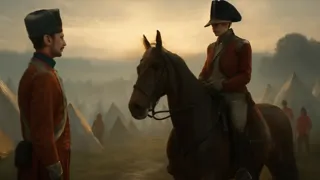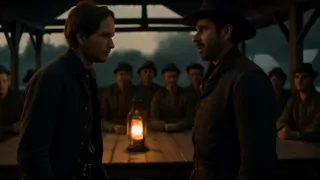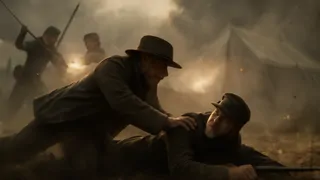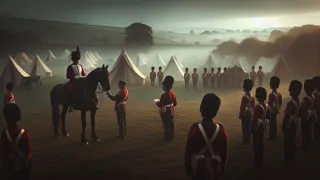Introduction
At the edge of a quiet clearing in the English countryside, the first threads of dawn revealed a gathering of red-coated soldiers, their breath rising in silver tendrils over dew-soaked grass. Captain Edward Sinclair stood solemnly astride his bay thoroughbred, the morning chill seeping through the thick wool of his uniform. His presence was rigid and precise, the polished brass of his epaulettes catching the subtle glow of the awakening sun. Across the field, a young man with ash-blond hair and sharp, observant eyes lined up at attention among the new orderlies. Friedrich Bauer, freshly arrived from the Prussian garrison, held himself with disciplined poise but betrayed a flicker of hesitation in his stance. Sinclair’s gaze was cool as he appraised the newcomer: a foreign soldier sworn to serve in the British Army under his command. The hush of dawn was broken only by muffled hoofbeats and the low murmur of officers inspecting boots and bayonets. Neither man offered more than a curt nod when their eyes met, but an unspoken tension soared between them—a coil of duty and distrust that would define each command and every reply. As the sky softened from slate gray to pastel gold, the camp stirred to life with measured cadence, and their uneasy partnership came quietly into focus under the pale morning light.
First Impressions at Dawn
Captain Sinclair studied Friedrich Bauer as he trotted forward on his mount, scanning every disciplined line of the young Prussian’s stance. The orderly’s uniform was immaculate, the dark gray tunic crisp against his lean frame, and his movements carried a precision that belied a stiff nervousness. Sinclair’s jaw set as he recalled the cautious letters from headquarters praising Bauer’s record in the Prussian army, yet his next thought drifted to the stony disdain displayed by some British privates at the sight of a foreign soldier. Bauer met his gaze with unwavering calm, though a faint color rose in his cheeks. The morning chill whispered across the field, lifting dust motes in the first pale rays of sunlight. Beyond the tents, dew-laden grass shimmered in muted green, and the distant treetops crouched under a mist that still clung to the earth. As the captain’s spurs softly clicked against his mount’s flanks, a crisp, clipped salute rose from Bauer’s right hand.

The hush stretched between them before Sinclair spoke, his voice carrying the rigid authority of rank. "Sergeant Mercer reports that you have completed advanced drills at the Königgrätz barracks. I expect no less discipline here." Bauer lowered his hand and inclined his head. "Yes, sir. I will serve to the best of my ability." The words were precise, tinged with a faint accent that spoke of distant borders and different commands. Sinclair traced the orderly’s form with a clinical eye: the steady breath, the unwavering posture, the swift reflex of hands that had polished boots and loaded rifles for months. There was something in the way Bauer’s muscles tensed and relaxed with economy—an echo of foreign garrisons and Prussian regimens that prized efficiency above all.
From the rows of canvas tents behind them, officers and privates emerged, gathering like silent witnesses to their first meeting. Horses neighed softly in the adjacent corral, and the clang of a nearby blacksmith hammering fittings punctuated the morning air. Sinclair adjusted the strap of his sabre and shifted in the saddle, a clear signal that the inspection was concluding. Bauer’s expression remained calm, yet his eyes flitted over the officer’s face, gauging each micro-expression for acceptance or critique. In that tense moment, as sunlight finally broke through heavy clouds, neither man could have guessed how long this charged stillness would linger in the heart of the camp—and how it would strain under the weight of every order barked, every foot polished, and every secret fear kept hidden behind professional courtesy.
Beyond the formalities and drills, Sinclair noticed small moments that hinted at Bauer’s quiet resilience. Each morning Bauer paused by a simple wooden crate tucked beneath the main tent, retrieving a tattered letter bound with string. Sinclair couldn’t read the looping script, but in the steady grip of Bauer’s fingers he saw longing and duty entwined. The orderly’s dark eyes often lifted to the horizon with a distant gaze, as if searching for something – a memory, a home, a promise yet to be fulfilled. Perhaps it was this fragile longing that drove Bauer’s unwavering dedication: a desire to prove his worth in a foreign regiment and earn a place beyond the cautious prejudice of his peers. At times, Sinclair found his own thoughts drifting to his family back in Kent, the image of his young daughter’s laughter clashing with his doubts about leaving her. In those private reflections at twilight, he wondered if his rigid demeanor had built more walls than trust, and if the Prussian orderly before him held the key to breaking them down.
As weeks melted into one another, the camp echoed with stories and murmurs that reached Bauer’s ears as quickly as they did Sinclair’s. Whispers about the ‘German lad’ circulated among the privates, some in admiration of his efficient service, others steeped in suspicion at his foreign accent. Sinclair observed Bauer field each rumour with an even temperament, never venturing beyond professionalism, though Sinclair himself felt a pang of regret for his own impatience. He began to offer terse remarks of thanks when Bauer completed an errand rather than curt nods, and Bauer’s eyes occasionally flickered with surprise before returning to their calm steadiness. A subtle shift rose in the space between them—a fragile bridge built on mutual courtesy rather than raw command. Yet the true test of that fragile bridge still lay ahead, hidden beneath the looming threat of conflict that even the morning’s mist could not conceal.
Tensions in the Ranks
Weeks passed under the steady cadence of drills and marches, and the shroud of polite distance between Sinclair and Bauer remained unbroken. The orderly served with unwavering attention—delivering dispatches, polishing uniforms, and ensuring that every rifle was clean before dawn reveille. Yet Sinclair’s orders, issued with crisp precision, sometimes cut closer than necessary, as if the captain sought to remind himself that authority still lay heavy upon his shoulders. The camp’s other officers watched the pair with quiet curiosity: some admired Sinclair’s unyielding standards, while others whispered unease over how lightly Bauer had escaped the captain’s ire when mistakes were made.

One gray afternoon, as low clouds pressed down on the ridge, Sinclair entered the mess tent to find Bauer clearing a wasp nest from the rafters. Strings of lantern light cast wavering shadows on the canvas walls. The captain’s arrival startled Bauer, who stumbled down from the stool, scattering papers on the dusty floor. Sinclair’s lips curved in a dry acknowledgement. "That will do, Bauer. Return to your duties." Bauer’s chin lifted in a measured nod. "My apologies, sir. I should have asked for assistance." The captain paused, his hand hovering near the hilt of his sword, then turned on his heel and walked back into the gloom outside. Bauer watched him go, heart heavy with careful restraint, aware that each interaction might ripple through the fragile trust yet to form.
A week later, a misunderstanding at the training grounds set off the spark neither man expected. During bayonet practice, Sinclair criticized a maneuver that Bauer had coached due to his Prussian expertise. The words sliced through the morning air: "That technique is not acceptable under British drills, Bauer. Return to the footwork I taught you." A hush fell over the assembled soldiers. Sinclair’s eyes narrowed, and he dismissed Bauer with a sharp, "Enough." As Bauer’s shoulders slumped, a fellow orderly stepped forward, his voice low with accusation about Bauer’s loyalty. The spark of discontent spread through the ranks—quiet sighs, judging glances, the intangible line dividing outsider from officer’s favored servant. In that tense exchange, both men felt the first true crack in their uneasy partnership, a fissure that threatened to widen with every passing order and every withheld word of empathy.
One evening, as lantern glow flickered over canvas walls, Bauer stood by the writing desk in the mess tent, transcribing Sinclair’s reports with meticulous care. The air smelled of roasting meat and damp earth, carried in through flaps that billowed under a persistent wind. Sinclair paused in the tent’s entrance, momentarily watching Bauer’s deft hands glide across parchment. Impulsively, the captain asked a question about Bauer’s hometown—an almost casual inquiry laced with genuine interest. Bauer froze for a heartbeat, then offered a guarded smile as he described a small village by the Rhine, its chimney smoke curling above neat rows of timber houses. Sinclair listened longer than he intended, the simple story casting light into corners of his own memory he seldom visited. When Bauer fell silent, Sinclair realized how rare it was for him to linger in conversation, let alone ask the questions that might breach the barriers of rank and blood.
Rumors of an impending campaign began to swirl: orders for an outpost near the coast, whispers of hostile skirmishes with insurgent forces. Bauer handled each bulletin with steadfast calm, indifferent to the specter of danger that accompanied every marching order. Yet one night, Sinclair found Bauer kneeling in the soft glow of a lantern outside the orderly’s quarters, praying in silent reverence over a tattered photograph pinned to the tent canvas. Sinclair cleared his throat, and Bauer rose with a start, gently tucking the photograph into an inner pocket. The look that passed between them was subtle—a fragile acknowledgment of shared vulnerability in the face of conflict—and Sinclair, shifting his weight, could not help but feel that the walls between them were softening.
Tension reached its peak during a sudden inspection when Sergeant Mercer flagged Bauer for an overlooked bolt on a musket. Voices rose, and shame crept across Bauer’s face as he knelt before the sergeant’s boots. Sinclair strode forward, voice low but firm: "The musket is serviceable. Enough." The tent fell silent, soldiers glancing from Bauer to the captain. In that charged instant, Sinclair chose to defend his orderly rather than let him face reprimand alone. The whispered gratitude in Bauer’s eyes was unspoken but clear, forging a fragile camaraderie that had once seemed impossible. As the storm of barking orders subsided outside, the two men shared a silent promise: that no duty would drive them apart again, not if they could help it.
By the time discipline orders fell silent beneath the moon, both men discovered how fragile yet resilient trust could be. Pontoon bridges linking riverbanks in distant skirmishes of duty and rank had been laid within the heart of a makeshift camp tent at the cost of a few simple acts of grace. Sinclair realized that leadership demanded more than rigid commands on the parade ground; it required empathy beneath the collar of a uniform and the willingness to shield those in one’s charge, no matter their origin. Bauer, in turn, learned that loyalty could transcend national borders when extended rather than demanded. The night air held a contemplative hush as they departed the tent side by side, each carrying the weight of responsibilities fled somewhere between pride and compassion. In that hush, they quietly honored the unspoken alliance born of professional respect and shared hardship.
Crisis and Reconciliation
One moonless night, an urgent alarm shattered the relative peace of the encampment. Flames erupted along the outer defenses as a band of raiders struck without warning. Sinclair and Bauer emerged from their quarters to the roar of muskets and the echo of cries. In the dim glow of scattered lanterns, chaos surged like a living tide. Sinclair barked orders, rallying his men, but a sudden crack of musket fire rang alarmingly close. In that split second, Bauer’s instincts overrode protocol: he lunged forward, grabbing Sinclair’s arm and yanking him out of the path of a stray musket ball. The bullet tore through Bauer’s coat sleeve, grazing his shoulder instead. Sinclair felt the stinging weight of guilt and relief in equal measure as he steadied his orderly and drew his own weapon.

Under the electric fear of battle, the two men moved as one. Sinclair’s measured commands coupled with Bauer’s swift readiness turned the tide at a vulnerable breach in the camp palisade. Their previous grievances faded into an urgent unity of purpose. As dawn broke over smoldering embers, the last of the raiders scattered under the disciplined volley of red-coated soldiers. Sinclair secured a final shot while Bauer knelt beside a wounded comrade, offering words of calm reassurance. Neither man spoke of past slights or harsh reprimands; instead, a somber hush fell over them, an understanding forged in fire and shared danger.
In the silent aftermath, Sinclair found Bauer near the flickering remnants of a hastily lit campfire. Blood spattered on Bauer’s grey tunic, yet his gaze held a steady invitation to acknowledge what neither could unsee. Gentle dawn light sifted through heavy clouds, casting long shadows on the trampled earth. Sinclair knelt beside his orderly and quietly pressed a field dressing into the wound. "I should have seen you at risk," he murmured. Bauer’s response was a calm breath, a nod that spoke volumes more than any formal salute. In those unguarded moments, the walls between them crumbled. Duty had drawn them together under impossible pressure, and gratitude intertwined with a newfound respect. In the quiet hush before orders resumed and drills commenced anew, the captain and his orderly stood as comrades—each profoundly changed by the silent heroism they could no longer ignore.
As the first rays of dawn pierced through churned smoke and fallen tents, the camp’s medics worked hastily to staunch wounds and tend to the exhausted men. Bauer knelt beside a young private whose leg had been torn by shrapnel, speaking in soft, reassuring tones despite the ache in his own shoulder. Sinclair, his uniform streaked with grime and powder, offered silent assistance, handing bandages and water with gloved hands that trembled only slightly. Around them, the stench of gunpowder gave way to the coppery scent of fresh blood and the low moans of those still finding breath. The crude shelter of a commandeered barn served as a sanctuary for the wounded, and within its shadowed rafters, Sinclair found Bauer methodically folding a bloodstained cuff into a tidy square. The gesture, simple yet tender, struck Sinclair like a revelation: respect had grown among chaos, and human connection had taken precedence over rank and nationality.
When the camp addressed its losses and honored its survivors, Sinclair requested a moment of silence in front of the assembled regiment. Bauer stood to the side, head bowed in humble acknowledgment. The captain spoke of courage, sacrifice, and the bonds that unite soldiers in war like brothers. As the crowd listened, Sinclair’s gaze softened when it fell upon Bauer, whose solitary figure spoke volumes of selfless service. After the ceremony, in the receding hush, Bauer approached with a carefully sealed letter—the very one he had guarded through the fight. Sinclair unfolded the worn parchment to reveal a sketch of a distant Prussian village, its friendly rooftops and church spire drawn with meticulous care. Without a word, Sinclair tucked the sketch into his own breast pocket and offered his hand, sealing an unspoken promise that duty and compassion would stand side by side, wherever the regiment might march next.
Conclusion
In the weeks that followed, the echoes of that moonless raid settled into the steady rhythm of camp life, but something fundamental had shifted between Sinclair and Bauer. The captain’s once-impassive gaze now carried a hint of warmth when he addressed his orderly, and Bauer moved with a quiet confidence that spoke of hard-earned respect. Their interactions grew measured yet genuine, each bearing the unspoken memory of a moment when rank yielded to life itself. Where once there had been silence or curt commands, now lingered small acknowledgments: a steadying hand on a rifle, the offering of a wrapped parcel of bread, the glance shared amid sunset drills. Other soldiers took note—whispers of change that rippled through the camp like the soft stirring of a fresh breeze. By the time the regiment broke camp and marched into open country, the bond between them had become an unspoken cornerstone of the company’s unity. Sinclair and Bauer walked side by side through the early mist of a summer morning, their steps in sync as if guided by a single purpose. It was a partnership forged not by convenience or protocol but by the raw crucible of danger and the quiet indebtedness that followed. In each exchange of order and response, they discovered something deeper: a testament to the transcendent power of shared hardship and the fragile, undeniable bridge of trust. In the end, the Prussian orderly and the British captain stood as equals, bound by an unexpected friendship that would outlast any campaign or clash of arms.


















